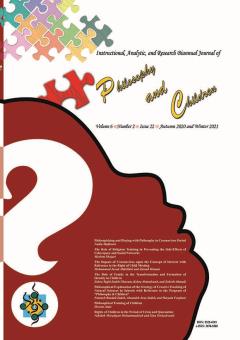Philosophical Explanation of the Strategy of Creative Teaching of Natural Sciences in Schools with Reference to the Program of “Philosophy & Children”
Subject Areas : «فلسفه و کودک» و نهاد آموزش و پرورش
1 - PhD in Education, Lecturer of University of Technology and Professional, Shahrud, Iran
Keywords: strategies of teaching, natural science, philosophy & children,
Abstract :
The age of childhood and youth is the best period for social, emotional, and cognitive growth of children. On the one hand it constitutes the basis of human life, that is, what man has gained during the last centuries is due to his thinking power which played a decisive role in his growth. Therefore, all his successes and progresses are rooted in his creative thinking. In this line the present article makes attempt to carry out a philosophical explanation of the strategy of creative teaching of natural sciences in schools with reference to the program of “Philosophy & Children”. The method of the work is analytic-descriptive based on library sources including laws, books, thesis, national and international articles. According to the findings of the article, creative thinking plays an important role in natural sciences. Accordingly, traditional method in teaching natural sciences, not only prevents the growth of critical thinking, but also brings about a gap between the programs and their implementations. Therefore, the only solution is to make a change in the way of teaching this science with reference to the program of “Philosophy & Children” and following a philosophical approach in teaching natural science.
برنامه درسی ملی جمهوری اسلامی ایران (۱۳۹۱) وزارت آموزش و پرورش.
کتاب راهنمای تفکر و پژوهش (۱۳۹۱) وزارت آموزش و پرورش.
اسپادک، برنارد (۱۳۹۴) آموزش در دوران کودکی، ترجمه محمدحسین نظرینژاد، مشهد: بهنشر.
باقری، خسرو (1389) درآمدی بر فلسفه تعلیم و تربیت جمهوری اسلامی ایران، تهران: علمی و فرهنگي.
برهمن، مریم؛ خدابخشی صادقآبادی، فاطمه (۱۳۹۶) «آموزش فلسفه برای کودکان»، مجله پیشرفتهای نوین، دورۀ ۲، شمارۀ ۹، ص104ـ90.
بندلیزاده، فاطمه (۱۳۹۲) بررسی فلسفه زیستشناسی با تأکید بر نظریه تکامل و کاربردهای آن در روشهای تدریس و ارزشیابی درس زیستشناسی، پایاننامه کارشناسی ارشد، دانشکده علوم تربیتی و روانشناسی، دانشگاه تربیتمعلم تهران.
خورشیدي، عباس؛ میرکمالی، محمد (1387) روشهاي پرورش خلاقیت در نظام آموزشی، تهران: یسطرون.
راصد، سعید (۱۳۸۵) «آموزش مستقیم یا فعال؟ نتیجه کدام یک پایدارتر است؟»، مجله رشد تکنولوژی آموزشی، شمارۀ ۵.
فیشر، رابرت (۱۳۸۵) آموزش تفکر به کودکان، ترجمه مسعود صفاییمقدم و افسانه نجاریان، اهواز: پرسش.
قائدی، یحیی (۱۳۸۳) برنامه آموزش فلسفه به کودکان، بررسی مبانی نظری، تهران: دواوین.
کدیور، پروین (1387) روانشناسی تربیتی، تهران: سمت.
کلانتری میبدی، سارا؛ بنيجمالي، شكوهالسادات؛ خسروي، زهره (۱۳۹۳) «بررسی اثربخشی اجرای برنامه آموزش «فلسفه به کودکان کودک» بر کاهش تفکرات غیرمنطقی دانش آموزان کلاس اول مقطع راهنمایی شهرستان بروجند»، مجله روانشناسي باليني و شخصيت (دانشور رفتار)، دورۀ 21، شمارة 11، ص48ـ37.
کلبادي، علیاکبر؛ تابان، لیلا؛ عربشاهی، باهره؛ عبدالله میرزایی، رسول (1388) سبکها و رویکردهاي چهارگانه آموزش آزمایشگاهی و جایگاه آن در برنامه درسی کارشناسی شیمی در دانشگاه. نهمین همایش ملی انجمن مطالعات برنامه درسی، دانشگاه تبریز.
هارلن، وین (1387) نگرشی نو به آموزش علوم تجربی در دوره ابتدایی، ترجمه شاهده سعیدی، تهران: مدرسه.
Allchin, D. (2003). Scientific myth-conceptions. Science Education, 87 (3). pp. 329-351.
Ausubel, D., Novak, J. and Hanesian, H. (1978). Educational psychology: a cognitive view. New York: Holt, Rinehart and Winston.
Erduran, S. (2020). Science education in the era of a pandemic: how can history, philosophy and sociology of science contribute to education for understanding and solving the Covid-19 crisis?. Science and Education, Vol. 29. pp. 233–235.
Flavell, J. H. (1979). Metacognition and cognitive monitoring: A new area of cognitive-developmental inquiry. American Psychologist. 34 (10). pp. 906–911.
Han, S.S., Catron, T., Weiss, B., Marciel, K. K. (2005). A teacher-consultation approach to social skills training for pre-kindergarten children: treatment model and short-term outcome effects. J Abnorm Child Psychol. 33 (6). pp. 681-693.
McComas. (2000). The nature of science in science education: rationals and strategies. London: Kluwer academic publishers.
Reiss, J. M. (2020). Science Education in the Light of COVID-19, the contribution of history, philosophy and sociology of Science. Science and Education. Vol. 29. pp. 1079–1092.
Vygotsky, L. S. (1968). Thought and language. trans. by, A. Kozulin. Cambridge, MA: MIT Press.
Zembylas. M. (2006). Science education as emancipatory: the 27 case of Roy Bhaskars philosophy of meta-reality. Educational Philosophy and Theory, 38 (5). pp. 665-676.

